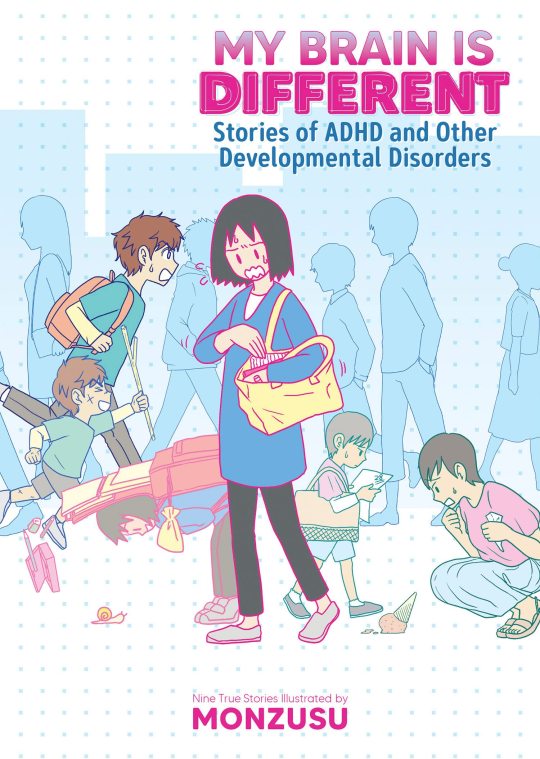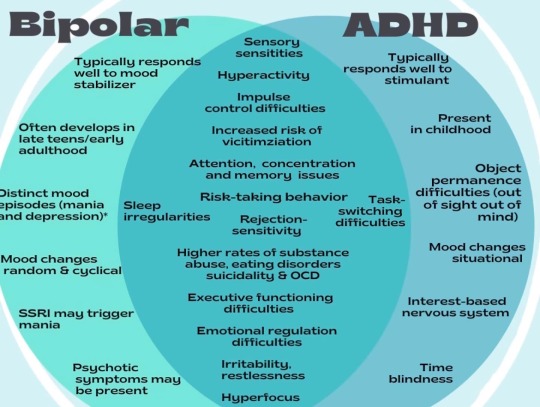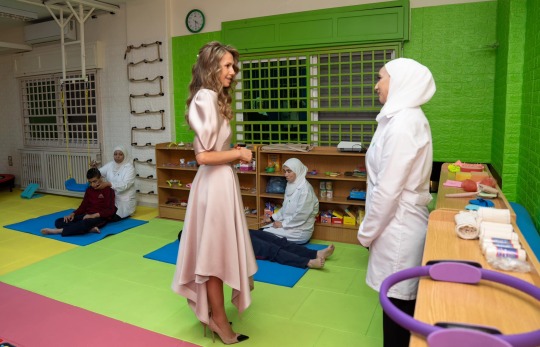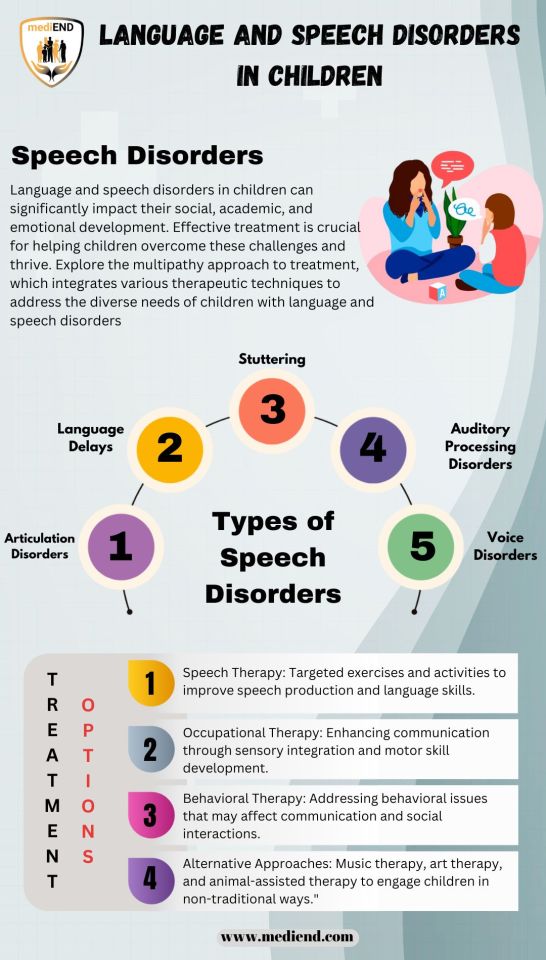#developmental disorders
Text
shoutout to slow learners. shoutout to people who take a very long time to parse and grasp new concepts. shoutout to people who struggle to follow directions. shoutout to people who can't perform a task just after watching someone else do it. shoutout to everyone who needs learning aids, needs to take notes, needs to try multiple times, and needs to be told the explanation repeatedly.
you're not dumb. you're not lesser. you're not doing it on purpose. everyone learns at their own pace, and people forcing you to learn faster than you can are the ones causing a disruption in your ability to learn. it's not your fault.
#autism#adhd#schizophrenia#ocd#dyslexia#mental illness#neurodivergence#neurodivergent#neurodiverse#disabled#disability#schizospec#schizospectrum#developmental disorders#downs syndrome#learning disorders#mad punk#mad pride#madpunk
13K notes
·
View notes
Text
I CRACKED A CODE
Guys? Guys? I CRACKED A MOTHERFUCKING CODE
LISTEN
LET NEURODIVERGENT KIDS ACT DRUNK WHILE BEING DEAD SOBER THEY ARE ACTUALLY FACTUALLY STIMMING BY PRETENDING TO BE THE ONE WAY THEY'RE ALLOWED TO BE SILLY
!! Neurodivergent Kids Pretend To Be Drunk Because It's The One Way Were Allowed To Unmask
Please this makes so much sense holy shit
#So if you ever wondered why you do this#Or used to#It was young you way of unmasking#And acting as they want#Without being judged (kind of)#Acting neurodivergent in the one way you're allowed to#Neurodivergent#Developmental disorders#Adhd#Autism#Growing up neurodivergent#Neurodivergent advice#Mental disorders#adhd stuff#living with adhd#actually adhd#actually autistic#autistic things#autistic community
269 notes
·
View notes
Text
Every time someone reduces dyspraxia to bad motor skills and completely ignores the mental effects that are equally or arguably even harder to deal with, I am allowed to commit one(1) crime.
#dyspraxia#actually dyspraxic#actuallydyspraxic#developmental disorders#developmental disabilities#but anyways guys this disorder affects EVERY aspect of your life#the processing issues. the executive dysfunction. the constant fatigue(even from doing tasks that have NOTHING to do with motor skills)#being overwhelmed all the time. being unable to express your thoughts. being unable to cope with life#many people with dyspraxia also struggle with memory but I lucked out on that#but uhh in short dyspraxia is way way wayyyyy more than just being uncoordinated#i’m actually diagnosed btw so i do have Experience Living With This#Quinn’s posts
138 notes
·
View notes
Text
you know what? I vote that instead of using 'neurodivergent' where we just mean adhd and autism we use the.. actual wording. we start calling them developmental disorders or developmental disabilities [which... is what they ARE] and perhaps even begin thinking about OTHER DDs such as NVLD or Downs .
#developmental disorders#developmental disabilities#autism#adhd#nvld#leaving the downs tag out of this bc frankly they deal with enough. dont need terminology discourse in the ring
87 notes
·
View notes
Text
Well crap, tumblr really thinks 'nd' or 'neurodivergent' is just a synonym for 'autism and/or ADHD'
Screw the rest of us with non-typical brains I guess.
#neurodivergent#neurodivergence#its not just audhd#personality disorders#how are you so incurious and ignorant about a group you claim to be a part of?#mental health issues#developmental disorders#intellectual disabilities#neurological conditions
2 notes
·
View notes
Text
*in an America Ferrara voice*
You have to achieve things but you can’t say you’re achieving things you have to say you’re “not that good” but you also have to be achieving things.
You have to lie but you can’t say you’re lying because that’s immoral.
You have to comfort people but never tell them the whole truth. You have to listen to them put themselves down but you can never agree with them.
You’re supposed to be proud of yourself but don’t talk about yourself all the damn time. You have to look after yourself but also never let your friends down.
You're expected to always know what people are feeling, which is impossible, but when you point that out you’re accused of being a bad person.
You have to stay supportive for your friends but not so supportive that it comes off as insincere or that it comes off as favouritism because you’re supposed to be a good friend to all of your friends but always be the best for everyone and always be grateful.
But never forget that you have best friends too so find a way to acknowledge that but always be grateful.
You’re supposed to never get tired, never be rude, never show off, never be selfish, never get overwhelmed, never fail, never show annoyance, never show exhaustion.
It’s too hard! It’s too contradictory and nobody gives you a medal or says thank you!
And it turns out that not only are you doing everything wrong but also everything is your fault.
I’m just so tired of watching myself and every single other neurodivergent person tie themselves into knots so people will like us.
And if all of that is expected and no one will even explain that it is to people who don’t know then I don’t even know.
#neurodivergent#barbie movie#autism#adhd#cluster a#cluster b#cluster c#dissociative disorder#personality disorder#schizophrenia#ocd#depression#anxiety#learning disorder#developmental disorders#bipolar#dyslexia#and many more#(feel free to add in tags)
4 notes
·
View notes
Text
“My Brain Is Different” - Personal, To the Point and Much Needed

“These kids aren’t trouble. They’re in trouble and need our help.”
I’m so happy that I got a chance to check out Monzusu’s “My Brain Is Different: Stories of ADHD and Other Developmental Disorders.” While very heavy at times since the book forced me to look at my own experiences, I appreciate the various takes on how to handle mental conditions that are looked upon with ignorance.
There’s 9 different personal stories from Japanese people who have a developmental disorder and/or is close to someone who does have one. I’m going to go over every story with some thoughts.
Terms discussed here (ADHD = attention-deficit/hyperactivity disorder, ASD = autism spectrum disorder, LD = learning disability)
Monzusu (ADHD, 30s’) - The author herself. She talks about her childhood and her hyperactive mind. She never understood why she wasn’t able to be a “normal” person as she was always trying things and then quitting when things get too rough. When she got married and had a child who would later be diagnosed with ADHD, Monzusu then starts to figure things out once she knew her condition. I think this was a good start for what’s to come. I can relate to Monzusu’s apathy in her early days because I get so mentally overwhelmed that I really don’t want to do anything, but I know I have to do something.
Highroad (ASD/ADHD, Depression, ‘30s) - A man who never felt he could interact with people after high school and resorted to being a shut-in. He went to see a psychiatrist who would give him medication. Even after taking it, Highroad never genuinely improved and even attempted suicide after some time. It wasn’t until he got an official diagnosis and some help from a social service program that he found some consistent employment that he can handle.
I see myself quite a bit in Highroad. I went to a psychiatrist after I thought about suicide. I got medication and it never really helped. Also, Highroad comments about doing work that he can handle without any pressure. I struggle to do jobs that involve managing people in a team. There’s also another bit where he talks about interacting with people with mental disabilities and how he still feels out of place because they’re too different. I find myself in that gray zone (which is a recurring theme in the book) where I’m not mentally well, but not on the extreme end. I’m stuck in-between and out of place in the spectrum of things.
Also, finding a workplace that understands your mental condition is so important (even though having that kind of conversation is hard).
Iku (ASD/ADHD, Depression, ‘20s) - This story is somewhat similar to Highroad’s. He struggled with interactions with other people ever since he was a child. As Iku got older, he couldn’t handle things and resorted to suicide twice. It wasn’t until he got an official diagnosis and better medication that his life turned around.
I don’t know how I feel about this story as Iku says some things I’m not sure I’m comfortable with. The medication sounds too good at its job and he talks about how he still doesn’t have any friends and his emotions are somewhat numb. But he is getting by and he says a really important thing that I finally grasped myself after a long time - he’s learned to not hate himself at the very least.
Hanako and her son, Tarou (ASD, Teens) - A mother talks about her struggles raising a child with ASD when everyone around her seems to be misunderstanding of her son’s condition. Hanako tries her absolute best to raise Tarou in a way where he can take care of himself and be respectful to those around him. When Tarou starts struggling with his schoolwork in junior high, he becomes disgruntled. It isn’t until he has a welcoming homeroom teacher and smart peers that he becomes better at learning. Tarou becomes the good and earnest kid that his mother wanted.
I love Hanako and her husband for being fighters for Tarou all the way. But I love how school saved Tarou. A lot of times, school is awful because of the multiple hierarchies there. Tarou talks about how being around smart people made him want to try and find similar folks like them. While Hanako does wonder if that’s the right approach, it does help Tarou get by, right?
Parents shouldn’t be the only ones fighting for their child. It really takes a village.
Matsubokkuri (ASD/ADHD/LD, Schizophrenia, ‘40s) - A woman with a very rough past tries to take care of her ailing mother. As a child, MB was considered too intelligent to the point that she was alienated by everyone around her. It did not help that her parents fought with each other all the time and her siblings didn’t seem to get along either. She went out to take on various jobs with no ambition. At the age of 28, MB was asked to come home to take care of her mother. While the two talked it out and MB stayed for years, finances became super-tight and it became a struggle to survive. Burnout happened to MB and she had to quit her job to become a full-time caregiver. It didn’t help that her mother ends up in an accident at home one day. MB blames herself for it as she went to get a eating utensil for her mother, who was struggling to sit down at her chair and then slipped and fell. MB’s younger brother stops by to tell MB that she might have a developmental disorder. MB finds out that she does and decides to figure things out for herself at the age of 46 while leaving her mother in the care of medical professionals.
This was a lot to take in. I think reading MB’s story generated some fear about my ability to take care of my parents when they can’t do anything anymore. I’m approaching 40 myself and it feels like I have some things I still need to figure out too. Awful family history always seems to have a way to project itself in the worst times, but I hope MB finds some peace with her life now - whatever it may be.
Mamu (ADHD, Depression, 30s’) - A young woman who always seemed to make many mistakes and felt like she wasn’t trying hard enough. She felt that she didn’t have a developmental disorder for the longest time as she was great at school when she was a child. But after going through a serious case of depression and getting an official diagnosis with medical help, Mamu realizes that she really was trying her best. She manages to find work that doesn’t force her to multitask (one of her “flaws”) and allows her to make clear and concrete lists of what tasks she needs to do.
Mamu cries when she realizes she’s trying her best. I want to cry too because I sometimes feel like I’m not doing enough. Maybe I only had one person who said that I was doing the best I could. Mamu does talk about disability employment programs and I wonder back then, if I could have used that to help me during a time when I needed it. Those programs would have made me realize certain truths that I only now just know.
Risa (LD, ‘20s) - A young woman who has a somewhat overbearing mother. When Risa’s mother learns that Risa has a learning disability, she tries her best to make sure Risa studies hard. However, Risa still struggles in school and even gets bullied in junior high. Risa’s mother later realizes that Risa should just focus on practical life skills rather than standardized education. As time goes on, Risa starts to focus less on school and more about going out to work to support her mother. The two still argue about how Risa should live her life, but there appears to be a more mutual understanding as Risa shows that she can still function for herself.
Recently, I was with my mother who accompanied me to an eye doctor. The eye doctor, who I knew for a very long time, said that my mom seems to worry about me a lot. He said that I looked capable of handling things for myself. I did joke there’s some half-truth to what she says. My mother was always trying to support me the best way she could, but she sometimes feels that my brain is different (pun intended). I’m trying to prove her wrong a bunch, but I later realize that my mom has been letting me figure things out for myself. So yeah, Risa and her mom’s relationship is something I totally get.
Yuuto (ASD, Adjustment Disorder/Depression, ‘30s) - A loving wife who has to deal with her husband and daughter sharing the same developmental disorder. Because of their disorders, Yuuto (the husband) becomes enraged at her daughter when she does something that appears to irritate him. The daughter, Rin, gets irritated the same way. Cat-Paw Punch (the wife) tries to figure out a solution as both don’t know how to accept their conditions. Cat-Paw Punch learns about positive reinforcement and uses it to get through to Yuuto and Rin. They’re a happy family in the end despite not being a “normal” one.
I love this story. There’s a part where Cat-Paw Punch tells Yuuto to stop hitting Rin or get divorced. I know people with developmental disorders can’t help their behaviors, but they shouldn’t be enabled to continue them if they’re harmful. Even caretakers need boundaries. A lot of caretakers forget this.
Yoshiko (ASD, Anxiety Disorder, Bipolar Disorder, ‘40s) - A woman with comorbidities who started off being a mess as a child. She always felt that she needed to be a proper child, but couldn’t. It wasn’t until junior high that a homeroom teacher convinced her to be more confident about herself. Yoshiko gets through high school and college and manages to get a job teaching kids with disabilities. It is there where she realizes that even though her childhood wasn’t great, she can use her experiences to help those whose experiences mirrored hers.
There’s a powerful moment in this story where Yoshiko struggles with volunteer work. She felt forced to do it as part of her college coursework. When she starts to struggle with volunteer work, her college counselor tells her it’s okay to quit when it’s not working. Yes, many adults tell you to never give up. But as they say, there’s a difference between courage and stupidity. It’s okay to give up on certain things as life happens. You can’t do everything despite what the life-hack industry tells you.
Also, the above quote at the start of this post is from this story. I don’t think there’s anything wrong with the kids and even if things are really, really bad, they really need the help of others.
-------------------
There’s a nice conclusion from Monzusu about her discoveries about those living with developmental disorders. She wishes that one day, we’ll have a world where tools that help deal with developmental disorders are considered normal. I totally agree. I also started to feel that developmental disorders are real and honest reactions to adverse conditions caused by outside factors combined with genetics. Unfortunately, because of cultural standards and hierarchies, anyone living with them is considered ill and not worth anyone’s time.
I do like that there’s people who are okay with having developmental disorders even though there’s people who hate them. I think the most important thing to take from this book is that we need more personal tales from those living with all kinds of mental conditions. A concern I have of mine is when celebrities talk about having some kind of developmental condition and what not. While it’s nice that they share their diagnosis, it hasn’t really moved the needle for mental health system improvement in America. Also, celebrities have resources regular people do not have like amazing access to people who will help them at the drop of a bat. It’s hard to learn from them honestly. Most people with developmental disorders and mental illness are just like the ones featured in Monzusu’s book.
So yeah, read this manga. I’m all for a patient/consumer view of things because it’s either the experts (professionals/activists) or famous people who have a say. Our brains may be different, but what we have in common is that our voices are just lost in the gray zone in the advocacy side of things often and that reeks of a systemic developmental disorder that needs to be addressed.
Anime Feminist has an amazing post about Monzusu’s manga, so go read that too!
#My Brain Is Different#ADHD#ASD#Depression#mental health#developmental disorders#manga#Monzusu#learning disability#mental illness
37 notes
·
View notes
Text
How many times to do I have to say that mental illness is not a blanket term for all issues of the brain.
It literally means you have a chemical imbalance.
If you have a structural imbalance then it is a developmental disorder.
If it is unhealthy patterns of thinking not caused by chemical or structural it is a personality disorder.
Please tag your shit correctly.
(Also for the love of God why is the bipolar tag full of BPD? Like don’t you have your own tag?)
14 notes
·
View notes
Text


I LOVE VENN DIAGRAMS THAT SHOWCASE MY NEURODIVERGENCES (also I didn’t make these, it’s from an account I follow on insta)
#neurodivergent#neurodiversity#comorbidities#mental illness#autism#autistic adhd#adhd#ptsd#cptsd#bipolar#bipolar disorder#anxiety#ocd#bipolar 1#bipolar mania#bipolar depression#trauma#neurological disorders#developmental disorders#autistic#afab autism#mental health#sensory processing disorder#actually autistic#attention deficit hyperactivity disorder#venn diagram
24 notes
·
View notes
Text
"Your spelling and grammer is shit how do expect anyone to understand you?" Well dumbass they either have to figure it out or not at all, I'm tired
#learning disability#Fangirlneverlie#learning disorder#actually autistic#intellectual disability#developmental disorders
7 notes
·
View notes
Text
So, I’m not exactly trying to make a statement or start discourse here, but I guess I’m just getting my experience out because I don’t see it represented a lot and I also wanna know if anyone else relates.
I have dyspraxia and I’m… really sick of it being reduced down to clumsy disorder and nothing else. Yes, I know that’s technically the main diagnostic criteria, but there hasn’t been a single time in my life where I’ve felt genuinely limited by having poor motor skills. It definitely shows itself in subtle ways, and I’ve had a neuropsych evaluation and poor motor skills are very evident in the results, but at the same time I feel like that’s the least of my issues when it comes to this condition. For me the mental struggles and other symptoms are the things that cause me the most grief, yet I swear they’re never mentioned, or when they are they’re mentioned very briefly. And it’s honestly so alienating.
For me personally, the mental disorganization is the worst part of this. I genuinely cannot accurately describe what it’s like feel trapped in your own head because your thoughts either don’t make sense or it’s too exhausting to try and sit down to make sense of them. So I just don’t communicate most of the time, which only adds to that trapped feeling.
Related to the previous point but my word recall abilities aren’t all the way there and it ties in to expressing myself being extremely difficult.
My processing speed is also pretty bad. Sometimes thinking feels painful, somehow. I hate having to put forth copious amounts of mental effort to just think. I can’t keep up in conversations and idk it just sucks.
There are some other things that I deal with but don’t impact me quite as much, such as: needing routines/structure to function because the world AND my head are just absolute disasters so having one thing be organized is nice, having some mild sensory issues, and I swear there’s other stuff but I don’t have the words right now and hey that’s what having your brain be a disorganized mess does to you.
I also don’t personally struggle with this as my memory somehow remained untouched, but I do see it mentioned occasionally, and it’s that a lot of people with dyspraxia struggle with short term memory.
Then when I try to find anything about this disorder or join communities it’s just about motor skills, and nothing else. Occasionally memory issues do get brought up but I can’t even relate to that either.
This is not a post trying to shame dyspraxic people whose biggest issue is genuinely their motor skills btw, because that’s their lived experience with this disorder and they’re not wrong for wanting to share their experience.
But I don’t even know how to end this lol I guess I’m just lamenting the fact that I rarely see posts about dyspraxia that I actually feel represented in. And this is coming from someone who’s been tested and diagnosed, so I doubt I don’t actually have it or something. Idk I guess I just wish more people knew that it was more than just having problems with motor skills, you know? I also wanna see if anyone relates at all because I’ve always felt super alone in this since I got diagnosed.
Also I have no idea if this makes sense at all or if I made my point accurately at all </3
This shouldn’t have to be said but I’m not trying to start discourse at all so don’t clown on this post 👍 also non dyspraxics can reblog to spread awareness just don’t speak over me/us
#dyspraxia#actually dyspraxic#neurodiversity#neurodivergent#developmental disorders#developmental disabilities#developmental coordination disorder#actuallydyspraxic#idk what else to tag this as hi 👋#Quinn’s posts#new tag since i dont make original posts at all LOL
131 notes
·
View notes
Text
I’ve always wanted to ask
Tumblr users with autism, what’s a fact you really wish more people knew about your condition?
2 notes
·
View notes
Text










Syrian First Lady Asma al-Assad attending the opening of the Amal al-Khani Centre for Autism and Developmental Disorders yesterday, 4 April 2024
#Asma al-Assad#Syria#autism#developmental disorders#disability#disabilities#neurodivergency#neurodivergences#🇸🇾 ♾
0 notes
Text

Language and speech disorders in children are common conditions that can greatly impact their development and communication skills. These disorders can affect a child's ability to understand and express language, as well as their ability to produce clear and fluent speech. Seeking treatment for these disorders is crucial in order to prevent long-term consequences and help children reach their full potential.
Check out this blog for a better understanding of language and speech disorders in children. https://mediend.com/blogs/language-and-speech-disorders-in-children
#Learning disabilities#Language disorders#Speech disorders#Children's health#Developmental disorders#Language development#Speech development
0 notes
Text
The ABA methodology is adaptable, allowing for customization to cater to the distinctive needs of each individual. While prominently utilized in autism-related contexts, the principles of ABA can be extended to diverse populations, effectively addressing a spectrum of behavioral challenges. If you are keen on gaining more insights into this matter, Able Autism Therapy Services, a top provider of ABA therapy services in Johns Creek, Georgia, has you covered!
0 notes